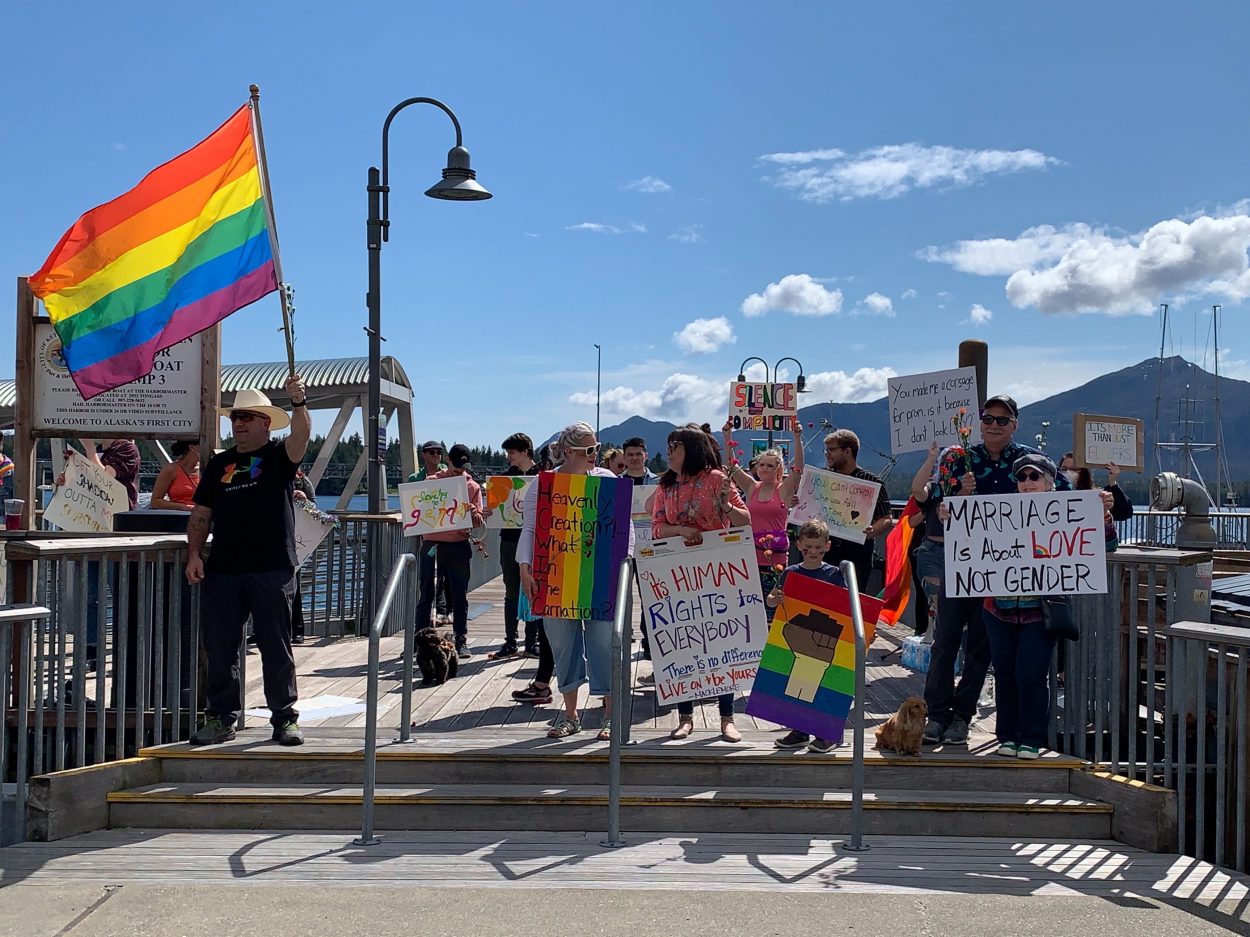
Protesters rally on June 5 outside a Ketchikan flower shop that reportedly refused to take an order for a same-sex wedding. (Eric Stone/KRBD
A wide-ranging anti-discrimination ordinance considered by Ketchikan’s city council has received tentative approval, but some on the city council objected to a provision that would outlaw the very practice that inspired the ordinance, which will be up for a final vote later this month.
Audio Player
It started with a flower shop that reportedly refused to sell flowers for a wedding between two men. More than 100 people turned out to rally across the street, including groom-to-be Tommy Varela.
“We’re here to show Ketchikan that there’s a community for queer people on this island, and we’re not going to stand for intolerance,” Varela told KRBD at the June 5 protest.
On the heels of that demonstration, Ketchikan City Council member Janalee Gage floated the idea of an anti-discrimination ordinance. The city’s attorney fleshed out the proposal and presented it to the council at its July 2 meeting.
The ordinance — as written — would provide sweeping protections for a number of marginalized groups. It would prohibit discrimination on the basis of race, color, sex, age, national origin, familial status, and disability — all classes protected by a variety of state and federal civil rights laws.
But Ketchikan’s ordinance goes further — it would add sexual orientation, gender identity and gender expression to the list of protected classes within city limits.
Though the U.S. Supreme Court recently ruled that a 1964 federal law protects gay, lesbian and transgender people from discrimination at work, the ruling’s impact in other settings is less clear. Ketchikan’s ordinance would outlaw discrimination against LGBTQ people in housing, and — controversially — in what are called “public accommodations.”
That is, it would prohibit businesses from doing what the flower shop reportedly did — refusing to sell a product or service to someone because of their sexual orientation, gender identity or gender expression.
But Gage says it goes far beyond flowers and wedding cakes.
“Graduate students trying to be social workers can refuse to counsel gay people. Doctors, paramedics, nurses can refuse to administer lifesaving medical services to trans women and men. Doctors are telling patients that it is against their religion to do a procedure that is life-changing because it is against their religion,” Gage told colleagues on the City Council. “And I’m not talking about abortion.”
The ordinance does include some carve-outs for private clubs and religious organizations. Churches are allowed to bypass the employment protections when hiring ministers — and now parochial schoolteachers as well, following a recent U.S. Supreme Court decision.
Ketchikan pastor Jeff White said he was glad to see that religious institutions were exempt from parts of the ordinance. But he said he’d like to see individual religious freedom protected, as well.
“As it’s written right now, while I’m in my church building, while I’m in the organization, I’m protected. But when I step out, there may be some conflict or opportunities to where my rights, as me personally as a Christian, would not be honored and protected,” he said.
White found support from three of the council’s seven members, including Mark Flora.
“Can someone reserve the right to refuse service to anyone? Well, […] if you are a merchant, a business, until somebody else wants to take your risk and your debt on and be responsible for that, I think we have to find some measure, some latitude, where those folks have the opportunity to control their destiny while still treating others equitably.”
Flora asked that the city attorney take another look at the ordinance to address those concerns. Council Members Judy Zenge and Dick Coose said they wouldn’t support the ordinance if it would require business owners to serve gay, lesbian and transgender people.
City Attorney Mitch Seaver explained that whether business owners can be compelled to serve LGBTQ people — as the ordinance would require — is itself an unsettled legal question in the country’s highest court. Seaver pointed to two cases, one from Colorado and one from Washington state, as examples of the U.S. Supreme Court sidestepping the question.
Council Member Dave Kiffer, though, said he didn’t buy the argument.
“I’m old enough to remember when, unfortunately, people used those competing rights as an excuse for discrimination — that we all agree now 50 years or 60 years later was completely beyond the pale. But 40-50 years ago, it was standard,” Kiffer said. “And they use the exact same arguments they’re using now. Chapter and verse. I’ve heard these before.”
He pushed to vote on the ordinance as written — that is, with the provision that prevents business owners from refusing to serve LGBTQ people.
“I doubt we’re going to end up in the Supreme Court and our counselor is correct: It’s not settled there. But I don’t see why that should stop us from taking a stand here,” he said. “I understand they’re competing rights, there will always be competing rights,”
Though three council members expressed skepticism, only one — Dick Coose — actually voted against the measure.
Ketchikan’s anti-discrimination ordinance will come back for final approval at the council’s next meeting on July 16.
This story has been updated to clarify how the council voted on the issue.





